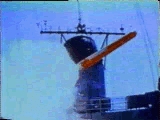Difference between revisions of "Tomahawk"
| Line 9: | Line 9: | ||
'''Script''' | '''Script''' | ||
| − | + | '' | |
| − | The missile knows where it is at all times. It knows this because it knows where it isn't. By subtracting where it is from where it isn't, or where it isn't from where it is (whichever is greater), it obtains a difference or deviation. The guidance subsystem uses deviation to generate corrective commands to drive the missile from a position where it is to a position where it isn't and arriving at a position where it wasn't, it now is. Consequently, the position where it is is now the position that it wasn't, and it follows that the position that it was is now the position that it isn’t. In the event that the position that it is in is not the position that it wasn’t, the system has acquired a variation, the variation being the difference between where the missile is and where it wasn’t. If variation is considered to be a significant factor, it too may be corrected by the GEA. However, the missile must also know where it was. The missile guidance computer scenario works as follows. Because a variation has modified some of the information the missile has obtained, it is not sure just where it is. However, it is sure where it isn’t, within reason, and it knows where it was. It now subtracts where it should be from where it wasn’t, or vice versa, and by differentiating this from the algebraic sum of where it shouldn’t be and where it was, it is able to obtain the deviation and its variation, which is called ERROR. | + | The missile knows where it is at all times. It knows this because it knows where it isn't. By subtracting where it is from where it isn't, or where it isn't from where it is (whichever is greater), it obtains a difference or deviation. The guidance subsystem uses deviation to generate corrective commands to drive the missile from a position where it is to a position where it isn't and arriving at a position where it wasn't, it now is. Consequently, the position where it is is now the position that it wasn't, and it follows that the position that it was is now the position that it isn’t. In the event that the position that it is in is not the position that it wasn’t, the system has acquired a variation, the variation being the difference between where the missile is and where it wasn’t. If variation is considered to be a significant factor, it too may be corrected by the GEA. However, the missile must also know where it was. The missile guidance computer scenario works as follows. Because a variation has modified some of the information the missile has obtained, it is not sure just where it is. However, it is sure where it isn’t, within reason, and it knows where it was. It now subtracts where it should be from where it wasn’t, or vice versa, and by differentiating this from the algebraic sum of where it shouldn’t be and where it was, it is able to obtain the deviation and its variation, which is called ERROR.'' |
'''Fad information''' | '''Fad information''' | ||
Revision as of 22:28, August 3, 2006
| Tomahawk |
|---|

|
| Original YTMND: |
| Tomahawk Missle is smart |
Where it isn't
Sites that are about the Tomahawk missile, usually making fun of its rather confusing description about how it finds where it is by knowing where it isn't. Remakes usually feature the original audio explanation along with Sigue Sigue Sputnik's "Love Missile F1-11".
Script The missile knows where it is at all times. It knows this because it knows where it isn't. By subtracting where it is from where it isn't, or where it isn't from where it is (whichever is greater), it obtains a difference or deviation. The guidance subsystem uses deviation to generate corrective commands to drive the missile from a position where it is to a position where it isn't and arriving at a position where it wasn't, it now is. Consequently, the position where it is is now the position that it wasn't, and it follows that the position that it was is now the position that it isn’t. In the event that the position that it is in is not the position that it wasn’t, the system has acquired a variation, the variation being the difference between where the missile is and where it wasn’t. If variation is considered to be a significant factor, it too may be corrected by the GEA. However, the missile must also know where it was. The missile guidance computer scenario works as follows. Because a variation has modified some of the information the missile has obtained, it is not sure just where it is. However, it is sure where it isn’t, within reason, and it knows where it was. It now subtracts where it should be from where it wasn’t, or vice versa, and by differentiating this from the algebraic sum of where it shouldn’t be and where it was, it is able to obtain the deviation and its variation, which is called ERROR.
Fad information
Some versions of the fad made fun of the phallic nature of the missile in the picture.
[1] and has already spawned such sites as [2] and [3].
ALSO: [4], [5], [6], [7], and of course the one featuring vandalism of the Wiki article on the axe, [8].
- This page is a stub. Make it meaningful and add something to it.